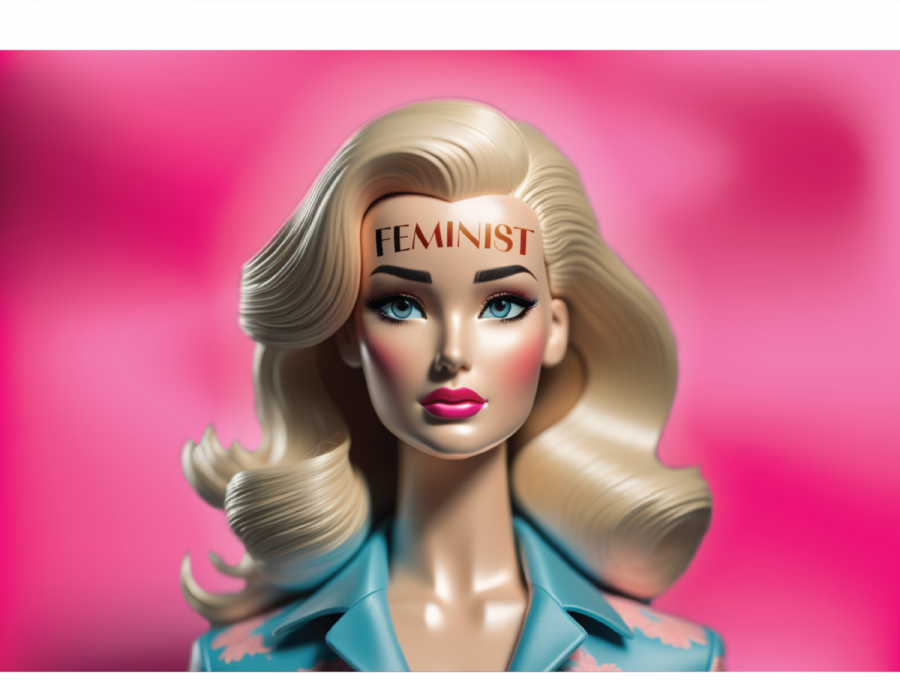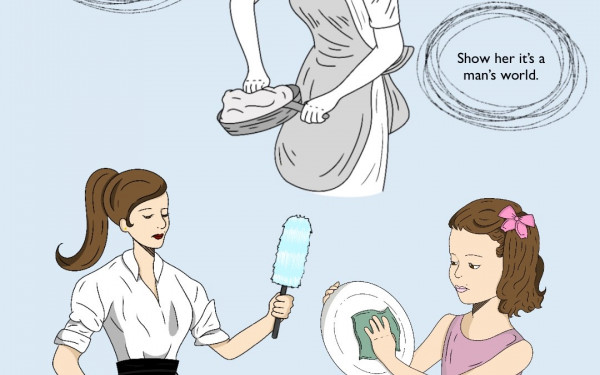Barbieland and patriarchy: an emotional crossover
The intellectual turmoil of corporate feminism, Gerwig’s satire of objectification, and the art of taking femininity seriously
The first time I went to watch the Barbie movie, the theatre was so jam-packed that I couldn’t even order a seat near my roommates. It was 10 p.m., and not one seat was empty.
A few minutes before showtime, I was sat between two men, which seemed odd to me but struck a chord of unexpected comfort, given the doll-themed film and the willingness of people to watch it regardless of their gender.
Friends gathering in matching fuschia attire created a sense of girlhood camaraderie. Leaving the theatre after an unexpectedly witty and clever first watch, I felt light-hearted. Strangers sharing cheerful "Hi Barbie!" greetings forged a unique bond rooted in mutual enthusiasm for the film and, perhaps, a deeper connection to the theme of girlhood, subverting the clichéd notion of a shared identity.
In my eyes, Gerwig's influence had woven its magic, not just through the cinematic narrative, but into the fabric of the audience's experience. With her material, she managed to create a palpable sense of community.
The mix of dramatic irony and satire, the humorously pseudo-intellectual yet genuinely insightful dialogue, especially when portraying the contradictions in our relationships, really spoke to me. And let's talk about that mind-blowing artistic direction! From the fun costumes to the diverse and talented cast, the well-crafted musical score, and the thoughtful exploration of Barbie's complex place in pop culture, all the way to having a beloved female director and being a movie designed for girls, the film is truly something special.
The second time I watched it, I was with my sister; that is when I really took in the premise of the movie and Gerwig’s message. For example, there was Barbie’s character development: her departure from Barbieland and her introduction to the real world, and all the metaphors that this movie implied. The film depicts an emergence from childhood—the discovery of what being a woman means when you hit puberty—the exposure to patriarchy.
This time, I was allowed to mourn my girlhood, decode a certain satirical objectification of women, and reflect on what it meant to chase a doll down to put her in her box. The aim to categorize women into labels will always benefit men, always always always.
I analyzed the script deeper and realized that everything was calculated to go beyond a traditional narrative. Delving into themes of feminism, gender roles, patriarchy, self-discovery, and societal pressures, it uses satire to highlight the complexities of these issues while emphasizing the importance of empowerment, self-acceptance, and authenticity. I thought it was genius.
However, critics have had diverging opinions given the conception and context of the movie. The more I wandered through them, the more I realized that the range of reactions is wide, and viewers are divided: some see the work as strongly feminist and celebrate it for that reason, while others reject it due to its perceived feminist stance, or complete lack thereof. Video essayists discussed in depth the political undertones of the movie. Reactions ranged from enthusiastic "It's completely feminist!" to cautionary "It's too feminist!" stances, while some saw it as a form of corporate feminism.
Video essayist Verily Bitchie qualifies the film as Plastic Feminism, going off about how the movie lacks its ties to a real and legitimate essence of Feminism, with a capital F. Their take is that Barbie is an archetype of how Gerwig seems to be building her career on remaking big franchises with a progressive coat of paint.
Video essayist Broey Deschanel, on the other hand, has pointed out how the context of the movie benefitted big corporations and devalued the Hollywood strikes. Her perspective highlights how Barbie was an inspired film and very creative in the way it was made, but that it was also made to rehabilitate Mattel’s image as a “hip” corporation, “that can get down with fellow kids without them ever needing to actually change the status quo in order to get down with us.” Even though she points out the misogyny-coated critiques Gerwig has received, her arguments revolve around how the movie enhances capitalism and the marketing of an object with its ubiquitous merchandising as an aftermath of Barbie’s release.
Although I agree that both creators made valid points, they missed something crucial; The movie wasn't meant to be a pure masterpiece of moralistic perfection or the perfect embodiment of anticapitalist feminist ideals.
For one, there were too many expectations for a co-production casting one of the largest toy makers in the world. Of course, Mattel, as a co-producer of the film, aims to reaffirm its image. This collaboration raises questions about the extent of Gerwig's creative freedom in representing girlhood and adhering to her own ethical standards.
The movie delves into numerous themes within a compact narrative, prompting us to consider the underlying intentions and strategies at play in its creation. To truly appreciate the film's approach, it's crucial to grasp the intricacies of this production partnership. A film can't please everyone while effectively addressing complex and inclusive messages.
I think most critics who rather adopted a cynical approach condescended and diverted focus from the movie's main strength: its emotional impact. Despite the challenging Hollywood context and political climate, the content and its messages were maximally explored within the confines of limited creative freedom. The film effectively conveyed its messages through various perspectives.
For days following our viewing, my roommates and I discussed the movie at great lengths. My roommate Zahra made a thought-provoking observation that resonated with me: the audience’s reaction makes the movie a girly thing, but the fine print makes the movie capitalist propaganda.
Barbie stands as a rare example of subversive cinema produced by major Hollywood studios. While it's valid to analyze the movie within Hollywood's capitalist framework, that's just the starting point. The film seemingly sells feminism through a two-and-a-half-hour-long toy advertisement.
The feminist aspect becomes a footnote, overshadowed by consumerism. Critics primarily view it as a doll-selling marketing ploy. However, we must shift our perspective. Beyond contextualization, we need to consider the audience's role and how they absorb the film's message.
Barbie's 'subversion' stems from corporate funding, with minimal audience consideration.
When it comes to making a feminist review of a film produced by a man, we almost always talk about how the audience feels. There is a striking imbalance now in terms of feminist-coded movies directed by women.
Drawing from British feminist film theorist Laura Mulvey's insights, we see how media's male creators struggle to evoke positive emotions in women, due to their inability to write multifaceted female characters. This leads to women either identifying with male characters, causing internal conflict, or objectifying female characters. Despite this ‘70s-based approach, we overlook the potential for identifying with female characters, like Barbie, in media produced by women.
Zahra's insight highlighted the need to shift the narrative in critiques. While contextualization and theory form the basis of critique, we should emphasize emotional reactions and recentre the movie on this aspect. Pseudo-feminist critiques inadvertently objectify Barbie, treating her purely as merchandise. Verily Bitchie's critique underscores this issue by portraying Barbie as problematic and reinforcing our object status. However, the opposite perspective might hold true: personifying Barbie could offer a solution. By making Barbie real and personified, we transform ourselves from objects to subjects.
My humble take on the movie makes me think of something I’ve always ingrained and never really voiced out; my own view of hyper-femininity and how I let the male gaze define my sense of self-worth.
Barbie prompts us to consider breaking down the stigma surrounding women in media. The film is significant in highlighting that women aren't the root issue in a patriarchal society. It delves into the helplessness experienced by all genders within this system, revealing the gender gap and the complexities of being a woman or man within it. This philosophy-driven movie primarily explores the devaluation and undervaluation of women within patriarchy.
After a second viewing and analyzing critics' perspectives, I've come to see the movie as promoting the completeness of women. It challenges the conception of a unidimensional personality. We are inherently intricate and captivating individuals.
I am an interesting and complete being.
The movie, like any, isn't flawless—it has ethical gaps, isn't universally inclusive, and benefits specific corporations. However, its overarching message strikes an emotional chord in women who grapple with insecurities while transitioning from girlhood.
Scenes of tea shared with an older woman, vulnerable conversations, and the absurdity of sparing a man's ego while seeking makeup assistance evoke relatable human experiences. These moments remind me of cherished interactions with inspiring women, amplifying my self-worth. It's in these subtleties that the movie truly struck a chord, conjuring memories of warmth, companionship, and growth.
I understood Barbie's existential questioning upon discovering real-world gender dynamics and her subsequent struggle with self-definition. The film portrays the earnestness of taking a feminine world seriously, highlighting the depth beyond patriarchal confines.
This article originally appeared in Volume 44, Issue 1, published September 5, 2023.





_600_375_90_s_c1.jpg)

